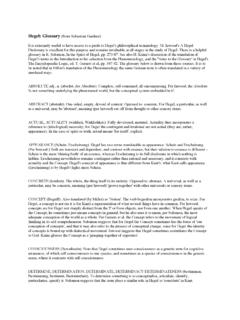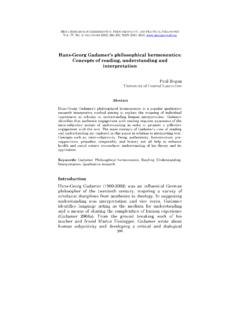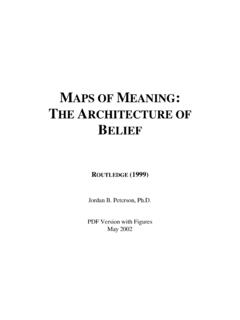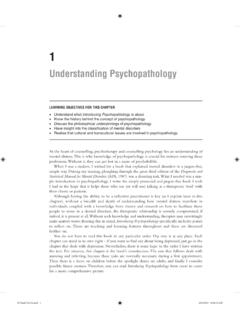Transcription of The Interpretative Phenomenological Analysis (IPA): A ...
1 International Journal of Education & Literacy Studies ISSN 2202-9478 Vol. 5 No. 2; April 2017 Australian International Academic Centre, Australia The Interpretative Phenomenological Analysis (IPA): A Guide to a Good Qualitative Research Approach Abayomi Alase School of Education, Northeastern University, Boston, Massachusetts, USA E-mail: Received: 27-02-2017 Accepted: 30-03-2017 Published: 30-04-2017 URL: Abstract As a research methodology, qualitative research method infuses an added advantage to the exploratory capability that researchers need to explore and investigate their research studies. Qualitative methodology allows researchers to advance and apply their interpersonal and subjectivity skills to their research exploratory processes.
2 However, in a study with an Interpretative Phenomenological Analysis (IPA) approach, the advantageous elements of the study quadruple because of the bonding relationship that the approach allows for the researchers to develop with their research participants. Furthermore, as a qualitative research approach, IPA gives researchers the best opportunity to understand the innermost deliberation of the lived experiences of research participants. As an approach that is participant-oriented , Interpretative Phenomenological Analysis approach allows the interviewees (research participants) to express themselves and their lived experience stories the way they see fit without any distortion and/or prosecution. Therefore, utilizing the IPA approach in a qualitative research study reiterates the fact that its main objective and essence are to explore the lived experiences of the research participants and allow them to narrate the research findings through their lived experiences.
3 As such, this paper discusses the historical background of phenomenology as both a theory and a qualitative research approach, an approach that has transitioned into an Interpretative analytical tradition. Furthermore, as a resource tool to novice qualitative researchers, this paper provides a step-by-step comprehensive guide to help prepare and equip researchers with ways to utilize and apply the IPA approach in their qualitative research studies. More importantly, this paper also provides an advanced in-depth Analysis and usability application for the IPA approach in a qualitatively conducted research study. As such, this paper completely contrasted itself from many books and articles that are written with the premise of providing useful and in-depth information on the subject-matter ( phenomenology , as a qualitative approach). Keywords: Interpretative phenomenology Analysis , IPA, qualitative research method approach 1. Introduction Researchers who conduct research projects of different kinds may find it frustrating to decide on the qualitative research approach to use for their research projects.
4 The truth of the matter is that it is not how many research approaches are out there in qualitative research methodology, but which one is flexible enough and participant-oriented enough to get to the real lived experiences of the research participants. As a guide for many new and novice researchers who are interested in conducting research projects in the following disciplines; education, sociology, psychology, political science, anthropology, economics, etc., the author felt it is important to update the research methodological approach he used in conducting his thesis research study to help inform and guide new researchers to a more comprehensive qualitative methodological tradition, The Interpretative Phenomenological Analysis (IPA) approach. The fact of the matter is that the thought of deciding on what research tradition or approach to use in a qualitative research study can be daunting and tedious. However, the good news is that qualitative researchers can take comfort in the fact that they have, at least, taken the first important step, the decision to conduct a qualitative research study.
5 As in any life endeavor that has adversarial (contrarian) dimension, the issue that consumes many researchers of qualitative and quantitative research methodologies is what method can produce long lasting, credible, and transferable research findings. As such both methodologies (qualitative and quantitative) are somewhat in a state of competition to see what methodology can produce the grandest research products. With all that said, it is not the objective of this paper to cast blame or fault on either side; or even promote one side over the other. The primary objective and essence of this paper are to update and expand on the process that the author undertook in his thesis methodological journey; the author wants to show how advantageous the benefits are for utilizing the Interpretative Phenomenological Analysis (IPA). IPA approach can afford new and novice researchers the opportunity to explore, in more detail, the lived experiences of the research participants.
6 Smith, Flowers, and Larkin (2009), three of the most acknowledged modern-day minds (theorists) in the IPA approach, stated that IPA is a qualitative research approach committed to the examination of how people make sense of their major life experiences (p. 1). Additionally, they asserted that IPA shares the views that human beings are sense-making creatures, and therefore the accounts which participants provide will reflect their attempts to make sense of their experience (p. 4). As Flourishing Creativity & Literacy IJELS 5(2): 9-19, 2017 10 such, IPA is seen by many researchers and admirers of the approach as the most participant-oriented qualitative research approach; a research approach that shows respect and sensitivity to the lived experiences of the research participants. 2. Key phenomenology theorists As a qualitative research approach, phenomenology was first conceptualized and theorized by Husserl (1931) as a way to understand the context of the lived experiences of people (research participants) and the meaning of their experiences.
7 However, many authors (theorists) have expanded on the theory to make it more aligned with the qualitative research methodology of today (Moustakas, 1994; van Manen, 1990). The theory of phenomenology has enlisted many brilliant minds and theorists in the expansion of its application and viability to its day-to-day usability by researchers of different educational discipline. The following are examples of some of the brilliant theorists and minds who have written about the usability of the theory of phenomenology . Perhaps one of the best known theorist and author is van Manen. van Manen in 1990 wrote extensively about hermeneutical phenomenology . Hermeneutical phenomenology , according to van Manen (1990, p. 4) is the lived experiences of research participants ( phenomenology ) and the interpretation (text) of the life they have lived and experienced (hermeneutics). Another well-known theorist and author is Moustakas. Moustakas in 1994 wrote about the psychological (also known as transcendental) phenomenology ; in which he was less concerned about the interpretation of the researcher s personal experience and more focused on describing the lived experiences of the participants in the research.
8 Moustakas (1994) advocated what we now know as the bracketing of researcher s personal experience from that of the research participants lived experiences . As a qualitative tradition, phenomenology is a well-known and well-used tradition, thus there are many less-known authors who have written or discussed some important aspects of the tradition in their research studies and/or in their writings. Giorgi (1994) is one of these authors. Giorgi (1994), a psychologist, discussed why it is important that Phenomenological researchers understand the holistic (wholesome) usefulness of a Phenomenological research study, so that they can make a strong and informed determination of the meaning unit . This meaning unit help transform and transfer the lived experiences of the research participants into a sensitive psychological expressions, so that these experiences ( essences ) can be written in a more reflective and descriptive manner (cited in Creswell, 2013). Another phenomenology theorist and author is Riemen (1986).
9 This author has written mostly in the medical field, especially in the area of caring, nursing. However, in order to develop a method of Analysis for phenomenology , according to Creswell (2013, p. 194), Riemen formulated the meaning statements from the significant statements in her study of caring by patients and their nurses, she presents significant statements of caring and non-caring interactions for both males and females. Additionally, as a way for phenomenology to have uniformity in the lived experiences of research participants, Polkinghorne (1989), another phenomenologist, advised that Phenomenological researchers should interview between 5 to 10 participants who have all experienced similar events (phenomenon). As such, the commonality of their experiences can be captured and interpreted. Finally, the history of phenomenology as a qualitative approach will not be complete without mentioning the names of Smith, Flowers, and Larkin (2009). These theorists and authors have individually, and collectively, revolutionized the theory and concept of phenomenology in today s practice.
10 As a credit to them, Smith, Flowers, and Larkin conceptualized and organized the new Phenomenological research tradition called the Interpretative Phenomenological Analysis (IPA). Again, to their credit, the functionality of the tradition (IPA) as a qualitative approach was superbly enhanced due to their collective efforts in redefining what the approach means and what it can do to help guide new and novice qualitative researchers in their quest to conduct qualitative research studies. 3. Interpretative Phenomenological Analysis (IPA) According to Smith et al. (2009), as a qualitative tradition, IPA comes into its own with the publication of Jonathan Smith s (1996) paper in Psychology and Health which argued for an approach to psychology which was able to capture the experiential and qualitative, and which could still dialogue with mainstream psychology (p. 4). At this junction, they asserted that the aim of IPA was to stake a claim for a qualitative approach central of psychology, rather than importing one from different discipline (p.)














